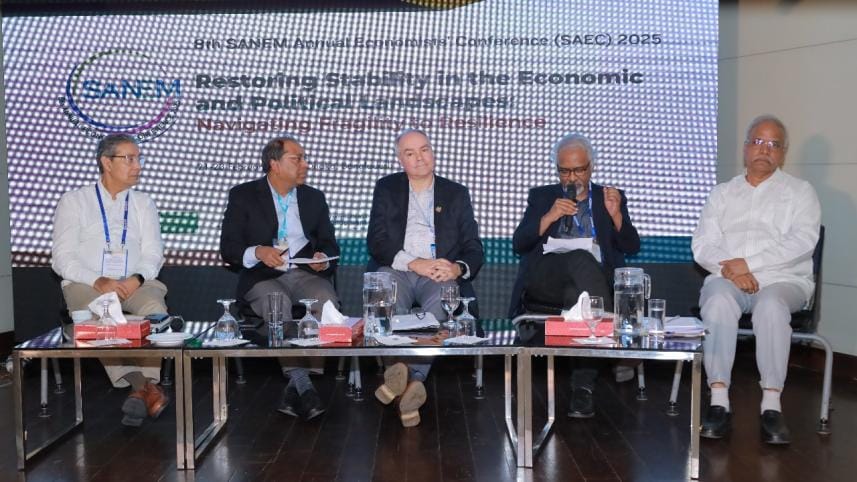Addressing women's labour market barriers key to Bangladesh’s growth

Bangladesh's economic growth could face significant challenges unless obstacles to women's participation in the labour market and vocational training are effectively addressed, said Tuomo Poutiainen, country director of the International Labour Organisation (ILO) for Bangladesh.
Gender imbalances and restrictions on women's access to diverse job opportunities may hinder the country's overall progress, he said.
He made the comments at a session titled "Setting the Labour Market Priorities Right for Bangladesh" on the third day of the eighth SANEM Annual Economists' Conference, organised by the South Asian Network on Economic Modeling (SANEM) at the capital's Brac Centre Inn.
Poutiainen further stressed that job creation should be driven through collaborative efforts between the public and private sectors, with foreign direct investment playing a significant role.
"True reform in the private sector is essential to create a path for quality jobs for Bangladeshi graduates."
There is no job that women cannot do but men can, he said.
"We must overcome the mental block that creates obstacles for women in the labour market," he added.
Syed Sultan Uddin Ahmmed, executive director of the Bangladesh Institute of Labour Studies, said, "We can't reform labour rights in isolation; it must be linked to skill development, education, and industry associations."
"Without a living wage, we cannot ensure decent jobs for everyone," he added.
Bangladesh's labour policies are largely shaped by international influences while domestic priorities remain overlooked, he said.
He added that the country's own workforce needs and labour rights concerns are often sidelined, as global stakeholders play a dominant role in policy decisions.
Iyanatul Islam, adjunct professor at the Griffith Asia Institute at Griffith University, Australia, said excessive regulations can hinder job creation, but well-designed policies, including minimum wages, effectively protect workers and promote equity.
He also highlighted the need for a strong foundation in labour economics, stating, "If you want to justify minimum wages, safe working conditions, and policies addressing gender disparities in Bangladesh, we need analytically robust and empirically credible labour economics."
Kazi Iqbal, senior research fellow at the Bangladesh Institute of Development Studies, addressed the 13 percent graduate unemployment rate in Bangladesh, attributing it to an oversupply of unskilled tertiary graduates and a lack of technical education.
He stressed the need for expanding affordable polytechnic institutes and targeted skill development programmes to better align the workforce with market demands.
Iqbal pointed out the mismatch between education and industry needs, noting, "There is an oversupply of tertiary graduates in Bangladesh, which is incompatible with the structure of the industry and the country's needs."
Bangladesh's growth has surpassed 6 percent, but labour market performance remains weak, with rising unemployment, increased self-employment, and declining real wages, said Radhicka Kapoor, senior employment specialist at the Decent Work Team for South Asia of the ILO, during her keynote presentation.
Rural female labour force participation surged from 36 percent to 52 percent, adding 4.2 million women.
Youth employment is higher, with educated youth favoured, she added.
Formal paid job growth is minimal, fuelling demand for government jobs. Labour-displacing technology and shifts from high- to low-productivity sectors further strain job creation, she said.
Productivity growth has outpaced real wage growth, while exports and investment as GDP shares are falling. Addressing these challenges requires industrial policy reforms, increased government expenditure, infrastructure development, and a focus on employment-driven growth, she added.



 For all latest news, follow The Daily Star's Google News channel.
For all latest news, follow The Daily Star's Google News channel. 
Comments